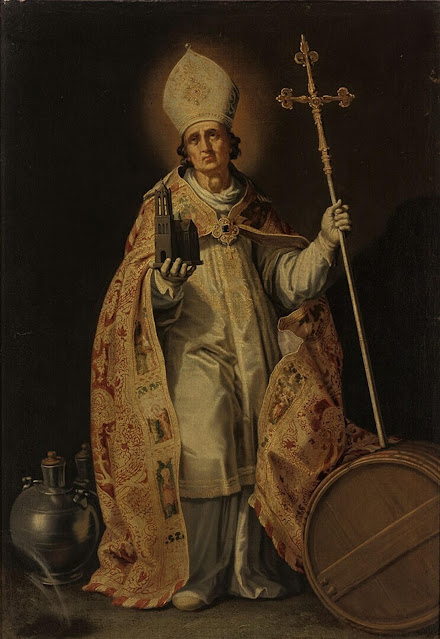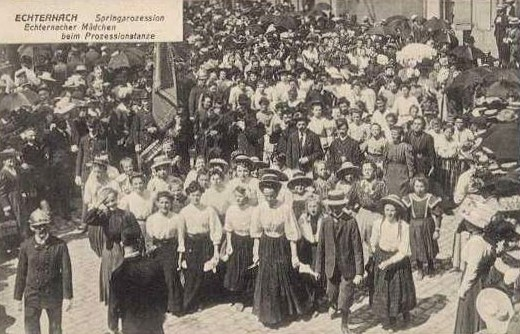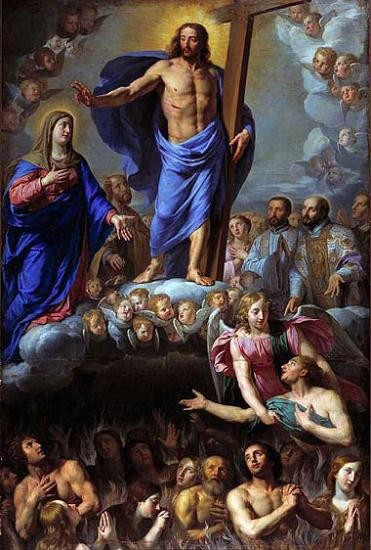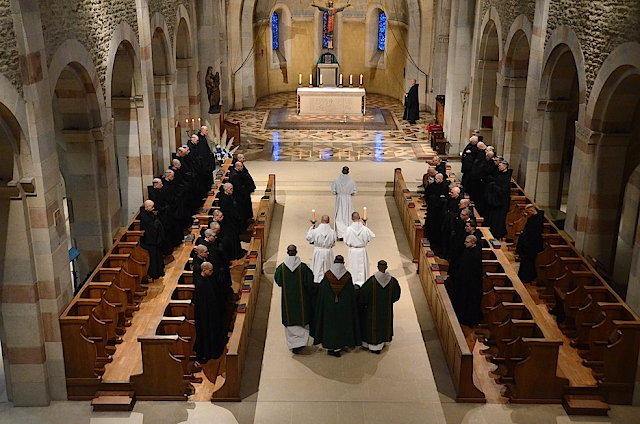Catholic devotions for the 7th November
Scroll down for today's
Saint of the Day/ Feast
Reading of the Martyrology
Dedication of the Month
Dedication of the Day
Rosary
Five Wounds Rosary in Latin
Seven Sorrows Rosary in English
Latin Monastic Office
Reading of the Rule of Saint Benedict
Celebration of Mass
Reading from the School of Jesus Crucified
Feast of Saint Willibrord
Bishop of Utrecht, Apostle of the Frisians, and son of St. Hilgis, born in Northumbria, 658; died at Echternach, Luxemburg, 7 Nov., 739. Willibrord made his early studies at the Abbey of Ripon near York, as a disciple of St. Wilfrid, and then entered the Benedictine Order. When twenty years old he went to Ireland and spent twelve years in the Abbey of Rathmelsigi (identified by some as Mellifont in Co. Louth) under St. Egbert. From him Willibrord and eleven companions received the mission to Frisia, at the request of Pepin. They came to Utrecht but did not remain there, repairing to the court of Pepin. In 692 Willibrord went to Rome, received Apostolic authorization, and returned to his missionary labours. At the wish of Pepin he went for a second time to Rome, was consecrated Bishop of the Frisians by Sergius III (21 Nov., 695) in the Church of St. Cecilia, and given the name of Clement. He also received the pallium from the pope. On his return he laboured among the people assigned to him; to raise recruits for future apostolic work he founded a monastery at Utrecht, where also he built a church in honour of the Holy Redeemer and made it his cathedral. In 698 he established an abbey at the Villa Echternach on the Sure; this villa had been presented to him by St. Irmina, daughter of St. Dagobert II, the donation being legally confirmed in 706.
When Radbod gained possession of all Frisia (716) Willibrord was obliged to leave, and Radbod destroyed most of the churches, replaced them by temples and shrines to the idols, and killed many of the missionaries. Willibrord and his companions made trips between the Maas and the Waal, to the North of Brabant, in Thuringia and Geldria, but met with no success in Denmark and Helgoland. After the death of Radbod he returned (719) and repaired the damages done there, being ably assisted in this work by St. Boniface. Numberless conversions were the result of their labour. Willibrord frequently retired to the Abbey of Echternach to provide more particularly for his own soul; he was buried in the oratory of this abbey, and after death was almost immediately honoured as a saint. Some relics were distributed in various churches, but the greater part remained at the abbey. On 19 Oct., 1031, the relics were placed in a shrine under the main altar of the new basilica. His feast is celebrated on 7 Nov., but in England, by order of Leo XIII, on 29 Nov. Since his burial Echternacht has been a place of pilgrimage, and Alcuin mentions miracles wrought there. The old church was restored in 1862 and consecrated in Sept., 1868. Another solemn translation of the relics took place on 4 June, 1906, from the Church of St. Peter to the new basilica. On this occasion occurred also the annual procession of the holy dancers — The Dancing Procession). Five Bishops in full Pontificals assisted; engaged in the dance were 2 Swiss guards, 16 standard-bearers, 3045 singers, 136 priests, 426 musicians, 15,085 dancers, and 2032 players (Studien u. Mittheilungen, 1906, 551).
Continues to this day
No writing can with certainty be attributed to St. Willibrord except a marginal note in the Calendar of Echternach giving some chronological data. On his testament or last will, which is probably genuine, see "Acts SS.", III Nov., 631. In the national library of Paris (No. 9389) there is a copy of the Gospels under the name of Willibrord; this is an old Irish manuscript and was probably brought by Willibrord from Ireland (Bellesheim, "Gesch. der kath. Kirche in Irland", I, Mainz, 1890, 623).
The Reading from the Martyrology
This Day, the Seventh Day of November
At Turin (in Italy), Blessed Peter of Ruffia, (martyr) of our Dominican Order. Appointed Inquisitor in Turin, he did not cease to shine by his great virtues, and especially by his zeal in defense of Catholic truth. Finally, on the day consecrated to the Purification of the Blessed Virgin Mary, a day most auspicious for himself, he was slain by heretics, and so merited to enter the temple of Heaven. A semi-duplex feast.
At Padua, the death of St. Prosdocimus, who was the first bishop of that city. He was ordained bishop by St. Peter the Apostle, and sent to that city to preach the Word of God. He died a holy death at Padua, adorned with many virtues and miracles.
At Perugia, St. Herculanus, bishop and martyr.
At Schwelm in Germany, the suffering of St. Engelbert, Bishop of Cologne. He was on his way from Cologne to Essen to consecrate a church, when he was attacked on the road by assassins and slain by numerous wounds. Thus, he suffered martyrdom for defense of the liberty of the Church and the authority of the Church of Rome.
On the same day, St. Amaranthus, martyr. He underwent loyally the test of his faith. At AN in Gaul, his body lies buried, but he lives in eternal glory.
At Melitina in Armenia, the suffering of Ss. Hieron, Nicander, Hesychius, and thirty others, who were crowned in the persecution of Diocletian, under the governor Lysias.
At Amphipolis in Macedonia, the holy martyrs Auctus, Taurion, and Thessalonica.
At Ancyra in Galatia, the suffering of Ss. Melasippus, Anthony, and Carina, under Julian the Apostate.
At Alexandria, Blessed Achilles, bishop, who was distinguished for his learning, faith, conduct, and purity of life.
In Friesland, the death of St. Willibrord, Bishop of Utrecht. He was ordained bishop by Blessed Pope Sergius, and preached the Gospel in Friesland and Denmark.
At Metz in Gaul, St. Rufus, bishop and confessor.
At Strasbourg, St. Florentius, bishop. +
Omnes sancti Mártyres, oráte pro nobis.
("All ye Holy Martyrs, pray for us", from the Litaniae Sanctorum, the Litany of the Saints)
November is the Month of the Poor Souls in Purgatory
NOVENA
For the Relief of the Poor Souls in Purgatory
SIXTH DAY Obligations to assist the Poor Souls
PREPARATORY PRAYER: Act of Faith: My God, I believe in Thee, because Thou art Truth itself; I firmly believe the truths revealed to the Church.
Act of Hope: My God, I hope in Thee, because Thou art infinitely good.
Act of Charity: My God, I love Thee with all my heart, and above all things, because Thou are infinitely perfect; and I love my neighbor as myself, for the love of Thee.
(Indulgence 7 years, 7 quarantines, each time. Benedict XIV., Jan. 28, 1756. Plenary once a month, if said every day. Benedict XIII., Jan. 16, 1728.)
MEDITATION: The Souls in Purgatory cannot help themselves; they are unable to shorten their captivity. This reason alone should urge us to come to their assistance.
After death there is no more place for mercy, the time for justice commences. The soul is no longer free to choose between good and evil, therefore she cannot obtain any merit and her sufferings are accounted only as a payment for her debts. Alas! to be condemned to such sufferings, to be afflicted perhaps during centuries! How bad it is for those “Poor Souls!”
Could we see an unfortunate man, lying on the road, wounded, bleeding and would we pass and abandon him! We hold the key of a prison, crowded with prisoners; they crave for liberty and shall we leave them in their pitiable situation! So we have received from the mercy of God the privilege of liberating the Souls detained in purgatory. We may say that we are the Providence of the dead; we, and we alone, may open the gates of Heaven to the Souls who are longing for their deliverance. It is the teaching of the Church, that the prayer of the living can be applied to the Souls in Purgatory. As your prayers ascend to Heaven, graces come down as a refreshing shower, bringing to the Souls forgiveness, liberty, and glory. The supplications of Mary and Martha obtained the resurrection of Lazarus. Let us address our prayers to the heart of Jesus, and we will deliver from their pains our dear departed ones. Shall we not be guilty if we do not employ our credit in favor of the unfortunate prisoners in Purgatory?
PRACTICE: St. John Chrysostom recommended to every Christian family that they have a box at some convenient place in the house and that they put into it pennies, which will be used to have Masses said for the “Poor Souls.”
RESOLUTION: Pray today for the most abandoned Souls.
EXAMPLE: At the Benedictine monasteries, when one of the monks died, his ordinary meals are distributed among the poor during thirty days. In the year 830, when a terrible plague was raging, many religious died. The abbot Rabanun Maurus gave the order to distribute the alms, according to the ancient usage, but the procurator did not obey. One night the stingy monk, having been delayed by his work, to shorten his way to his cell, passed through the Chapter room. There he was surrounded by all the monks, recently dead, who whipped him, leaving him half dead on the floor. Early the next morning he was found by the religious, who were going to the chapel. He related the event, made his confession, received the last rites and died two days afterwards.
PRAYER: De Profundis
Let us pray: We humbly beseech Thee, O Lord, to release the Souls of Thy Servants, in order that they may obtain the glory of the resurrection and that they may be joined to the saints and elect in Heaven. Through our Lord Jesus Christ. Amen.
V. Eternal rest give unto them, O Lord.
R. And let perpetual light shine upon them.
V. May they rest in peace.
R. Amen.
(300 days each time for W. and RR., applicable only to the dead. Pius X., Feb. 13, 1908.)
Tuesday is the Day dedicated the Holy Angels
Tuesdays, in addition to honoring the Angels, are the day for honoring the Holy Face and honoring St. Anthony of Padua. On the Tuesday after St. Anthony's death, the day his funeral cortege took his body to the church, many miracles took place, so this day is commemorated in his honor. A special Novena to St. Martha is also made on nine consecutive Tuesdays (or on all Tuesdays) by some Catholics.
CHRISTE, sanctorum decus Angelorum
Rector humani generis et auctor,
nobis aeternum tribue benigne
scandere caelum. ]
CHRIST, the fair glory of the holy Angels,
Thou who hast made us, Thou who o'er us rulest,
grant of Thy mercy unto us Thy servants
steps up to heaven.
ANGELUM pacis, Michael ad istam
caelitus mitte, rogitamus aulam:
nobis ut crebro veniente crescant
prospera cuncta.
SEND Thy Archangel, Michael, to our succor;
Peacemaker blessed, may he banish from us
striving and hatred, so that for the peaceful all
things may prosper.
ANGELUS fortis Gabriel, ut hostem
pellat antiquum, volitet ab alto,
saepius templum veniat ad istud
visere nostrum.
SEND Thy Archangel, Gabriel, the mighty,
herald of heaven; may he from us mortals
spurn the old serpent, watching o'er the temples
where Thou art worshiped.
ANGELUM nobis medicum salutis
mitte de caelis Raphael, ut omnes
sanet aegrotos, pariterque nostros
dirigat actus.
SEND Thy Archangel, Raphael, the restorer
of the misguided ways of men who wander,
who at Thy biding strengthens soul and body
with Thine anointing.
HINC Dei nostri Genetrix Maria,
totus et nobis chorus Angelorum
semper assistat, simul et beata
concio tota.
MAY the blest Mother of our God and Savior,
may the assembly of the Saints in glory,
may the celestial companies of Angels
ever assist us.
PRAESTET hoc nobis Deitas beata
Patris ac Nati pariterque Sancti
Spiritus, cuius resonat per omnem
gloria mundum. Amen.
THIS He vouchsafe us, God forever blessed,
Father eternal, Son, and Holy Spirit,
whose is the glory which through all creation
ever resoundeth. Amen.
The Sorrowful Mysteries of the Rosary are prayed on Tuesday
"I would like to remind you that the Rosary is a biblical prayer, all filled with the Holy Scriptures." It is a prayer from the heart, in which the repetition of the Ave Maria directs the thought and affection towards Christ, and thus is made a confident prayer to Him and our Mother. It is a prayer that helps to meditate on the Word of God and assimilate the Eucharistic Communion, on the model of Mary who kept in her heart everything Jesus did and said and even His Presence. " Pope Benedict XVI
The Rosary in Latin
Chaplet of the Five Holy Wounds of Christ in Latin
Chaplet of the Seven Sorrows of Our Lady in English
Latin Monastic Office for today from Le Barroux in France Texts also provided
XXXI DE CELLARARIO MONASTERII, QUALIS SIT
1 Cellararius monasterii eligatur de congregatione, sapiens, maturis moribus, sobrius, non multum edax, non elatus, non turbulentus, non iniuriosus, non tardus, non prodigus,
2 sed timens Deum; qui omni congregationi sit sicut pater.
3 Curam gerat de omnibus;
4 sine iussione abbatis nihil faciat.
5 Quae iubentur custodiat;
6 fratres non contristet.
7 Si quis frater ab eo forte aliqua irrationabiliter postulat, non spernendo eum contristet, sed rationabiliter cum humilitate male petenti deneget.
8 Animam suam custodiat, memor semper illud apostolicum quia qui bene ministraverit gradum bonum sibi acquirit.
9 Infirmorum, infantum, hospitum pauperumque cum omni sollicitudine curam gerat, sciens sine dubio quia pro his omnibus in die iudicii rationem redditurus est.
10 Omnia vasa monasterii cunctamque substantiam ac si altaris vasa sacrata conspiciat.
11 Nihil ducat neglegendum.
12 Neque avaritiae studeat, neque prodigus sit et stirpator substantiae monasterii, sed omnia mensurate faciat et secundum iussionem abbatis.
CHAPTER 31: THE QUALITIES OF THE MONASTERY CELLARER
1 As monastery cellerar there should be chosen from the community one who is wise, of mature character, temperate, not an excessive eater, not haughty, not turbulent, not harmful, not sluggish, not wasteful,
2 but God-fearing; one who can act as a father to the whole community.
3 He is to have charge of everything;
4 he is to do nothing without an order from the abbot.
5 He is to keep custody over his orders;
6 he is not to sadden the brothers.
7 If one of the brothers happens to request something unreasonably, he is not to treat him with disdain and thus sadden him, rather he must reasonably and with humility deny the bad request.
8 He is to keep custody over his own soul, remembering always that apostolic saying: he who has ministered well acquires a good standing for himself (1 Tim 3:13).
9 He is to care for the sick, for children, for guests, and for the poor with all solicitude, knowing without doubt that for all these he will have to give an account on the Day of Judgment (cf .Luke 16:2).
10 He is to look upon all the vessels and goods of the monastery as though they were the sacred vessels of the altar.
11 He is not to neglect anything.
12 He is not to be avaritious, not wasteful, not be a squanderer of the monastery’s resources; rather he is to do everything in proper measure and according to the order of his abbot.
Today's Celebration of the Mass
May the Passion of Jesus Christ be always in our hearts














.jpeg)

Comments